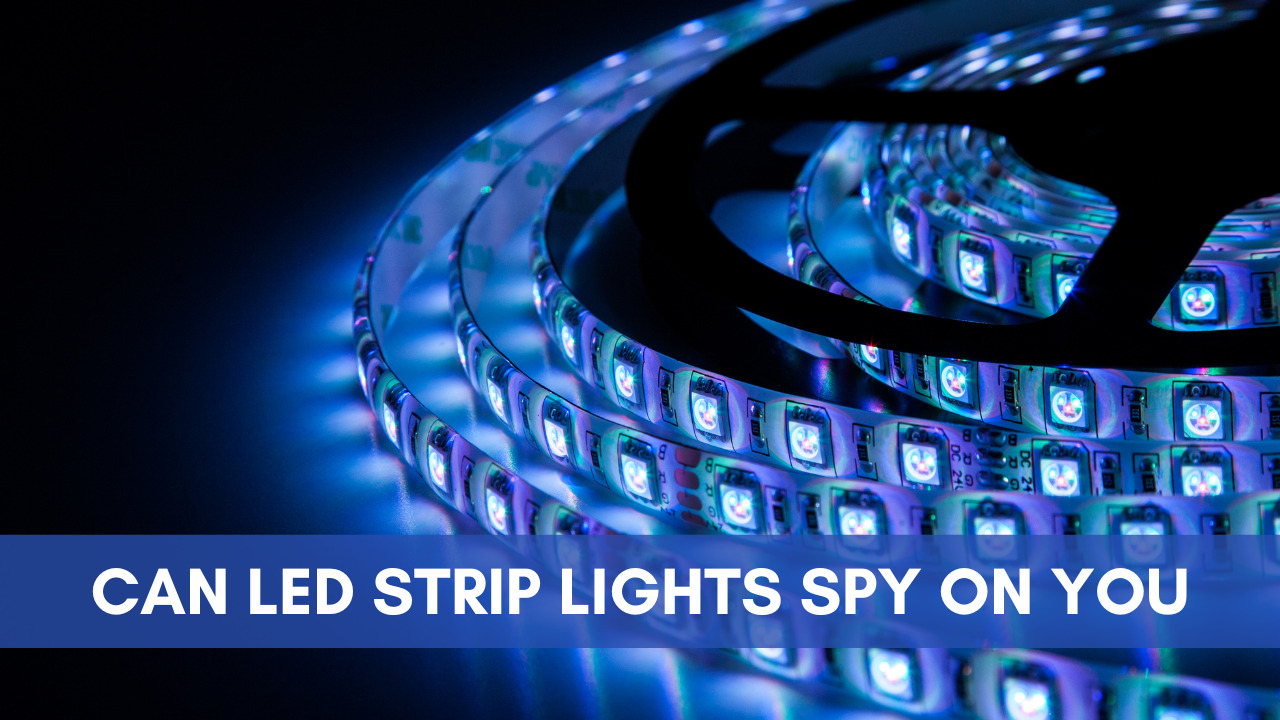Even the least common objects, like LED lights, can be used for espionage purposes. Smart technology is still in its infancy, which is exciting given its excellence. But happily, individuals are becoming increasingly concerned with the security of their data as the adoption of smart electricals increases.
However, there is a difference between being cautious with your data and unnecessarily fearing that every smart object will infiltrate your life and reveal your details and secrets. There are still stories about smart light bulbs and if they might serve as spy cameras.
According to the company, an electronics manufacturer tested a system where LED store bulbs follow customers. When they do, every lamp in the business may exchange messages with the customers’ phones using pulses of light that the human eye cannot see.
Table of Contents
Working Mechanism Of LED Strip Lights
Smart lighting, except for some more complex systems, is simply LEDs; there isn’t any incredibly complex science involved. On they come. Turning off, they. Color shifts occur. If you’re lucky, they might perform some elaborate flashing light feats for events and other things.
You have even more alternatives if you’re connected to a smart hub or even one of their applications. One such choice is the capability to schedule the activation of your smart lighting at specific periods.
To have your lights do what you want them to at the time you want them to, you also have the option of using motion sensors or even voice commands. In reality, smart lighting is highly practical, especially if you’re traveling or working away from home.
By letting the lights turn on and off to give the impression that someone is home, you can assist dissuade criminals. Smart lighting may illuminate your driveway, so you don’t return home to a pitch-black house or driveway.
Do LED Strip Lights Really Spy On You
Although they can be hacked, smart light bulbs cannot spy on you. They lack both audio and video recording equipment.
Security updates will stop this from happening, but a skilled hacker might be able to access the firmware stored on their microchips and exploit the Wi-Fi connection of smart lights to access other wireless devices in the home.
The lack of microphone technology in smart bulbs makes it impossible for them to record sound. When near a smart light bulb, you don’t need to be careful what you say.
Your typical smart bulb will use very basic technology that functions creatively. Depending on whether it is a simple bulb, the LED lighting array in the bulb will have a different level of complexity.
Additionally, it will contain a heat sink to keep the LEDs cool and power management to assure proper voltage flow into the bulb. The wireless chip is the next component, which normally connects to a hub even though some lights can connect directly to your phone.
Some of the most recent bulbs also include Bluetooth technology, allowing you to control each bulb individually rather than using more Wi-Fi.
Is It Possible To Use LED Strip Lights To Spy?
Yes, in some cases, LED strip lights can be used to spy on us. However, it would cost you more than you think if you want to use LED lights for spying purposes. According to some theories, hidden cameras may be integrated into light bulbs and any type of lighting.
These sites are bustling with activity, not to mention the wide variety of individuals who pass through at all hours of the day and night. To prevent significant incidents and potential threats, the in-charge must take every precaution.
Theoretically, if someone gained access to your wireless hub, they could be able to determine how you use your lights, giving them some insight into your life, but it wouldn’t be accurate.
Should You Stop Using LED Strip Lights And Bulbs?
Of course, not. To begin with, you are likely to use much technology connected to your equally insecure home network. Let’s say you desire complete internet safety. In that situation, you’ll have to turn in your smartphone and ensure that your security cameras are hard-wired and do not have wireless receivers.
Smart lights are an element of the connectedness that permeates modern life. To take the appropriate precautions, you should ensure you’re responsible for your home’s smart network and data use.
Ensure you constantly download the most recent security updates for all your LED lights and bulbs.
How To Check If There’s A Hidden Camera In LED Lights?
Smart lights now come with built-in covert cameras that are sold separately. On the package, nevertheless, this is frequently stated. It’s improbable that any hidden cameras are used if you buy a smart bulb or smart lighting strips to light your home.
There are a few techniques to determine whether one might exist if you’re inquisitive. Infrared lights are a common feature of cameras, to start. These lamps are necessary to capture video in dim or challenging lighting situations.
Typically, red or green tints are emitted by these lights. Shut off the light to determine if your bulb has one. In a dark room, this is especially effective. After the light has been turned off, examine the bulb more closely to check whether any light emanates from the core.
If there are any lights inside, there is a good chance a camera is inside. The sound of buzzing is another indicator. You may hear a faint humming sound from some devices because they react to each other’s radio frequencies when positioned close together.
Since the smart light uses its radio frequency to interact with the lighting, you could hear a faint buzzing sound.
Conclusion
As said earlier, LED strip lights or smart bulbs can’t spy on you on their own. So don’t be concerned about them listening in on your private discussions. Your wireless network might be hacked, but as long as you stay up to speed with security patches and stick with trusted brands, you won’t have any problems.
Although it’s not completely impossible, it’s quite improbable that cameras will be placed within our smart LED bulbs. Because of the high cost of the equipment needed to spy on us from our smart house lights properly, the ordinary smart home manufacturer does not consider it worthwhile.
Thankfully, if necessary, there are ways to determine whether your lights do indeed contain cameras.





